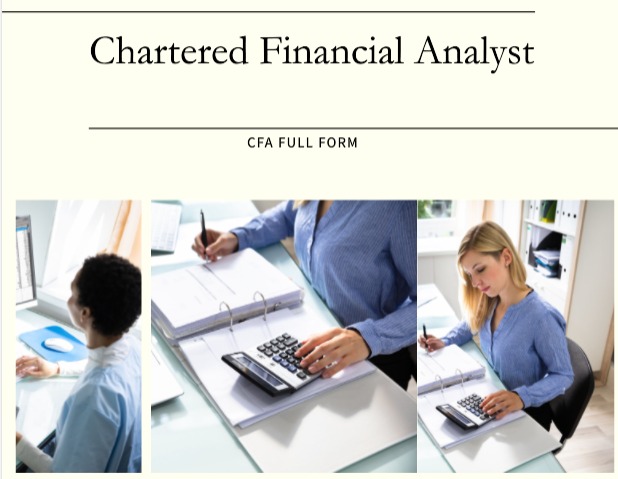Summarize this Article with:
What is CFA Full Form | Role in Investment Management & Financial Analysis?

The Chartered Financial Analyst (CFA) designation is a globally recognized certification for investment management and financial analysis professionals. This article will cover the basics of the CFA program, including the CFA Institute, the exam, and the requirements for earning the designation.
It will also delve into the advantages of becoming a CFA charter holder, including career prospects and earning potential. This article will provide an overview of the different levels of the CFA exam.
It will also provide some tips and strategies for preparing for and passing the exam. Whether you are considering pursuing the CFA designation or simply want to learn more about the field of investment management and financial analysis, this article will give you a comprehensive introduction to the world of CFA.
What is CFA?
Chartered Financial Analyst (CFA) is a professional designation offered by the CFA Institute to investment and financial professionals who have completed a rigorous education and examination program.
The CFA program is globally recognized as the gold standard in the investment industry. It is designed to provide candidates with a comprehensive understanding of investment management and financial analysis.
CFA is a benchmark for investment professionals. It is to ensure that those with the CFA designation have the knowledge and skills necessary to be effective investment managers and analysts. The program covers a wide range of topics, including ethics, financial reporting and analysis, portfolio management, economics, and quantitative methods.
CFA charter holders are recognized for their expertise in investment management and financial analysis. The designation is highly valued by employers in the finance industry. Many of the world’s leading investment firms require or strongly prefer CFA candidates.
The CFA program is also relevant to individuals interested in investing their own money, as it provides a strong foundation in financial analysis and portfolio management. Overall, the CFA program is an essential qualification for anyone seeking a career in investment management or financial analysis.
CFA Exam
The CFA exam is a globally recognized and highly respected certification exam for investment professionals seeking the Chartered Financial Analyst (CFA) designation. The exam is administered by the CFA Institute and consists of three levels, each must be passed sequentially.
The Level 1 exam consists of 240 multiple-choice questions, while the Level 2 and Level 3 exams are composed of item-set questions and essay questions, respectively. The exams cover a wide range of topics related to investment management.
These topics include ethics, economics, financial reporting and analysis, corporate finance, portfolio management, and asset classes such as equities, fixed income, derivatives, and alternative investments.
Passing the CFA exam is a significant achievement and a key step in becoming a CFA charter holder. A CFA charter demonstrates to employers and clients a high level of competency, integrity, and professionalism in investment management.
It is considered one of the most rigorous and prestigious designations in the financial industry. Passing the exam requires a lot of time, effort, and dedication.
CFA Institute
The CFA Institute is a global organization of investment professionals that promotes investment management ethics, education, and professional excellence. It was established in 1947 and is headquartered in Charlottesville, Virginia, United States.
The CFA Institute plays a crucial role in administering the CFA program, which is a globally recognized credential for investment professionals. The institute develops and administers the CFA exam, sets ethical and professional conduct standards, and offers a variety of educational and professional development programs for its members.
Membership in the CFA Institute provides a range of benefits, including access to a global network of investment professionals. It also provides exclusive resources and research, career development opportunities, and opportunities to volunteer and give back to the profession.
Members also hold high standards of ethical and professional conduct, which maintains the investment management industry’s integrity and reputation. Membership in the CFA Institute can provide a significant advantage for investment professionals seeking to advance their careers. This will enable them to make a positive impact in the field.
CFA Ethics and Standards
CFA Institute’s Code of Ethics and Standards of Professional Conduct is a set of guidelines that all CFA charter holders must adhere to maintain the integrity of the investment profession. The code includes six main principles, professionalism, integrity, diligence, loyalty, objectivity, and confidentiality.
Professional conduct standards provide specific guidance on how to apply these principles in various situations. These include client relationships, investment analysis, and communication with the public. The CFA Institute regularly updates these standards to reflect changes in the investment industry and to ensure that CFA charter holders are held to the highest ethical standards.
Ethical behavior is essential in the investment industry, as it helps maintain clients’ trust and ensures financial markets’ integrity. The CFA program reinforces these principles by requiring candidates to complete an ethics module as part of the exam. It requires charter holders to testify to their conformity with the code of ethics and professional conduct standards every year.
The CFA Institute’s Code of Ethics and Standards of Professional Conduct plays a crucial role in promoting ethical behavior in the investment industry. It also maintains the CFA designation’s reputation.
CFA Program Eligibility and Preparation
Eligibility for the CFA Program: To be eligible for the CFA Program, a candidate must have a bachelor’s degree or equivalent, or be in the final year of their bachelor’s degree program. Additionally, they must have at least four years of qualified work experience or a combination of work experience and education.
Preparing for the CFA Exam: Preparing for the CFA exam can be a daunting task, but there are several resources available to help candidates succeed. The CFA Institute provides a comprehensive curriculum that covers a wide range of topics related to investment management and financial analysis. In addition, there are several study resources available, including study guides, practice exams, and review courses.
It is recommended that candidates begin studying at least six months before the exam date. They should create a study plan that covers all the necessary material. It is important to focus on understanding the material rather than just memorizing it, and to practice problem-solving skills through practice exams and questions.
To prepare effectively, candidates should use a variety of study techniques, including reading the curriculum, taking notes, creating flashcards, and reviewing key concepts. They should also use practice exams and questions to test their knowledge and identify areas for further study.
To prepare for the CFA exam, candidates should utilize the CFA Institute’s curriculum and study resources and create a comprehensive study plan. This covers all the necessary materials. They should also focus on understanding the material rather than memorizing it and utilize a variety of study techniques to effectively prepare for the exam.
Chartered Financial Analyst
Chartered Financial Analyst (CFA) is a professional designation given to individuals who have passed the CFA program and met the CFA Institute requirements. CFAs are experts in investment management and financial analysis, and their skills are highly valued in the finance industry.
CFAs work in a variety of roles, including portfolio management, research analysis, and investment banking. The CFA designation is highly respected and recognized globally, as it demonstrates a high level of knowledge and expertise in finance. CFAs are known for their ethical standards and professionalism, making them extremely sought after in the finance industry.
Investment Management
The CFA program is highly relevant to investment management, as it equips candidates with the knowledge and skills necessary to make informed investment decisions. The program covers a wide range of topics, including financial statement analysis, asset valuation, portfolio management, and risk management, among others.
Successful completion of the program demonstrates a candidate’s expertise in these areas, making them highly valuable to employers in the investment management industry.
To be a successful investment manager, one must understand financial markets. In addition, one must have the ability to analyze and interpret complex financial data. Additionally, effective communication and interpersonal skills are essential, as investment managers must work closely with clients and colleagues to develop investment strategies and manage portfolios.
The CFA program helps candidates develop these skills through a combination of theoretical and practical coursework, preparing them for successful investment management careers.
Financial Analysis
Investment analysis and portfolio management are highly relevant to financial analysis as part of the CFA program. To be a successful financial analyst, one must have a strong foundation in finance, accounting, and economics. In addition, one must have the ability to analyze financial statements and develop informed investment decisions.
CFA charter holders are equipped with the knowledge and skills needed to perform comprehensive financial analysis, including valuation techniques, risk management, and financial modeling. They are also trained to understand the impact of economic events and market trends on investments, making them valuable assets to any financial organization.
The CFA program provides a comprehensive curriculum that covers all aspects of financial analysis. This makes it an essential qualification for anyone interested in a career in finance or investment analysis.
conclusion
The CFA program is a rigorous and comprehensive certification program that prepares individuals for a successful career in investment management and financial analysis. The program, administered by the CFA Institute, includes a series of exams that cover a wide range of topics in finance and investment.
The CFA designation is highly respected in the finance industry and indicates a high level of expertise and knowledge in the field. Eligibility requirements include a minimum of four years of work experience and completion of the program exams. Preparation for the CFA exam requires dedication and commitment, with many resources available to help.
Successful completion of the CFA program provides individuals with the skills and knowledge required to succeed in investment management and financial analysis. The CFA program plays a significant role in the finance industry and provides opportunities for professional growth and advancement.
Hey, how much did you like What is CFA Full Form | Role in Investment Management & Financial Analysis? Please share your view in the comment box. Also, please share this story with your friends on social media so they can also enjoy it, and for more such Full form, please bookmark storiespub.com.
Related Post
- AI Full form
- IPS full form
- API Full Form
- The Inside Story of LBW
- GPS Full Form
- TDS Full Form
- Who Are NRI: Non-Resident Indian (NRI)
FAQs
What does CFA stand for?
CFA stands for Chartered Financial Analyst.
What is the CFA program?
The CFA program is a worldwide recognized finance professional certification program.
How long does it take to finish the CFA program?
It typically takes an average of four years to complete all three levels of the CFA program.
What are the eligibility requirements for the CFA program?
A candidate for the CFA program must have a bachelor's degree or equivalent or be in the last year of their bachelor's degree program.
What is the format of the CFA exam?
The CFA exam is a computer-based test that consists of multiple-choice questions and item sets.













